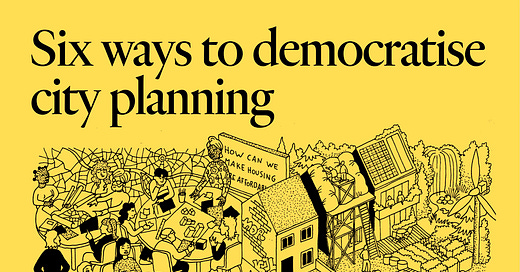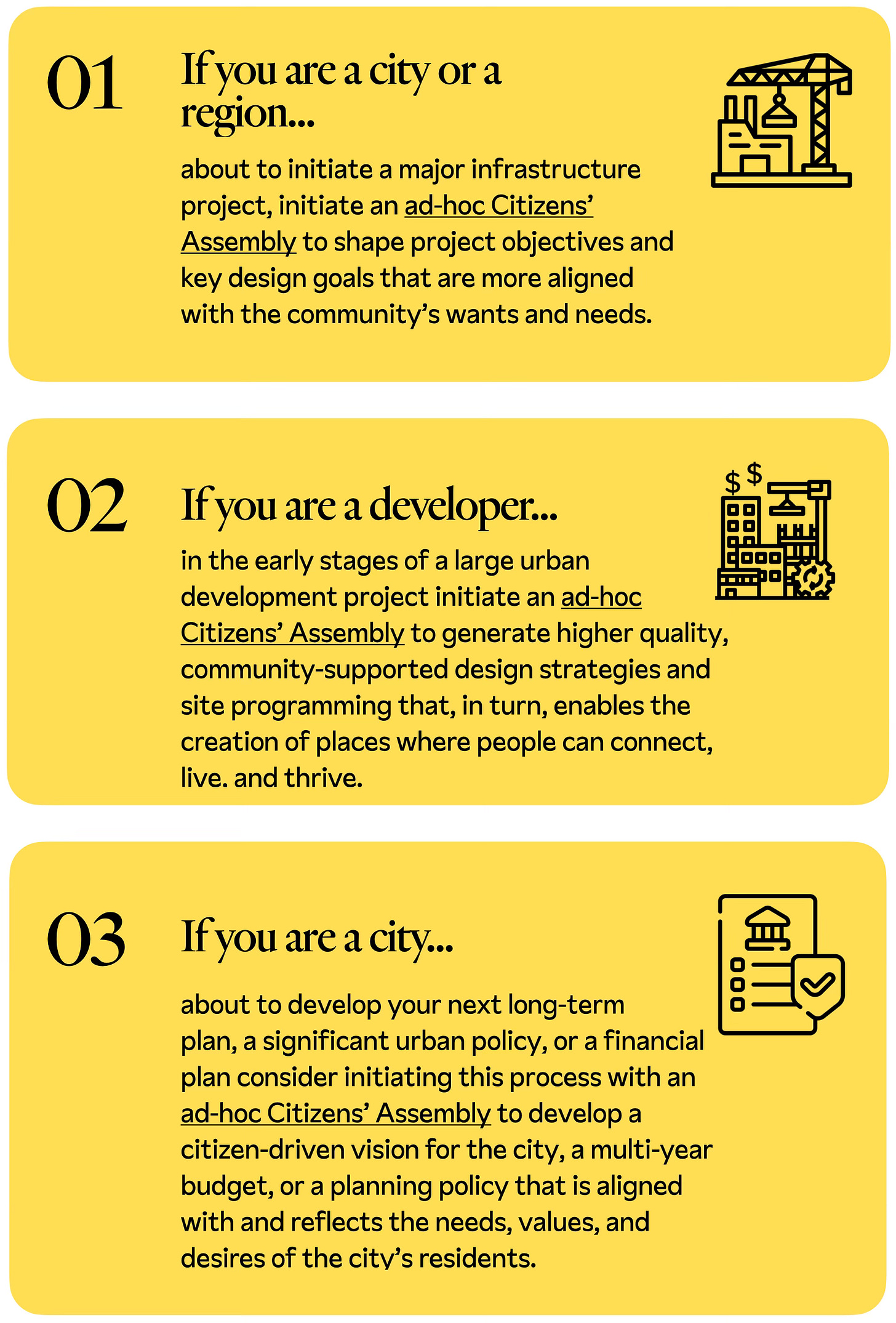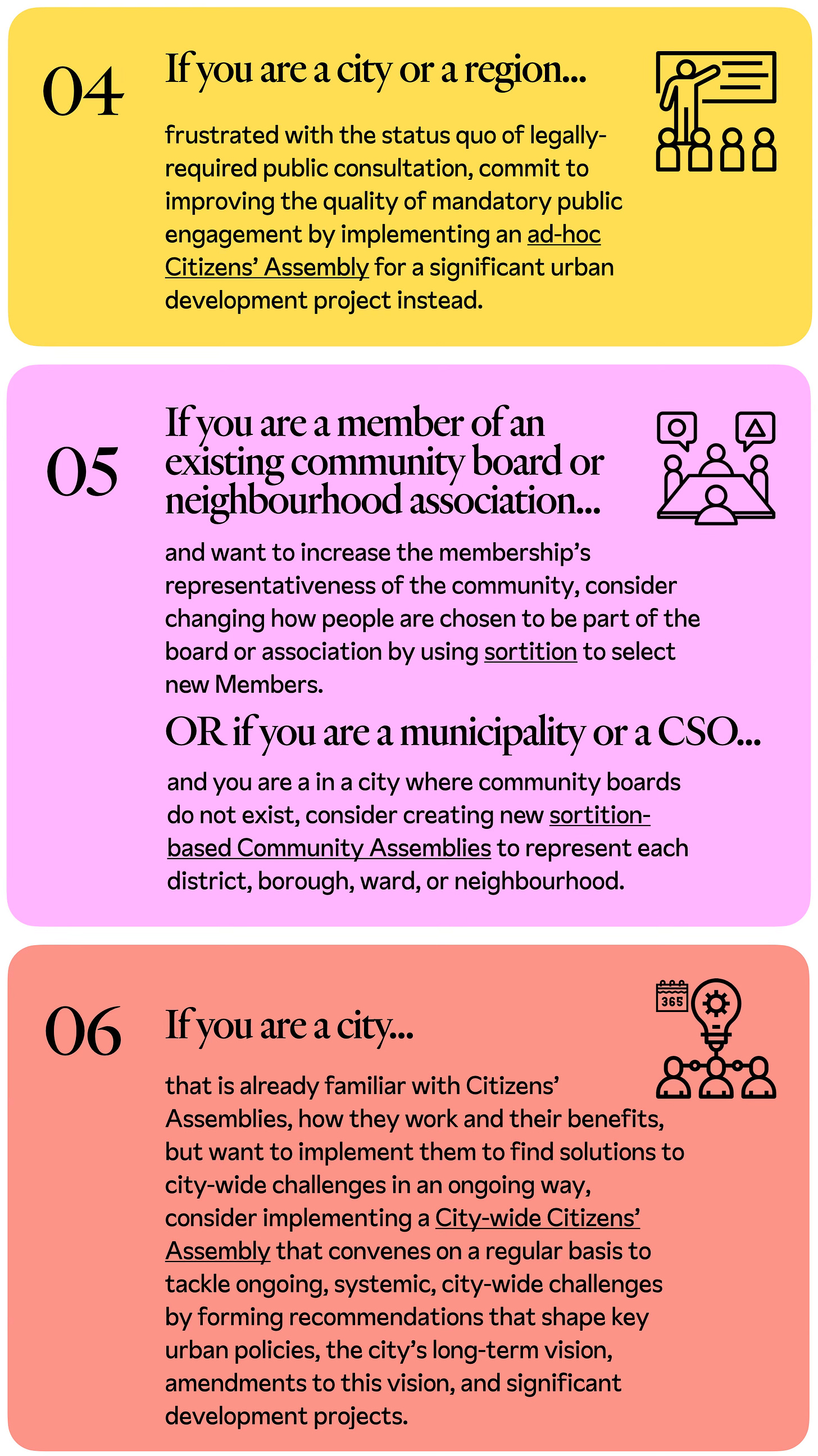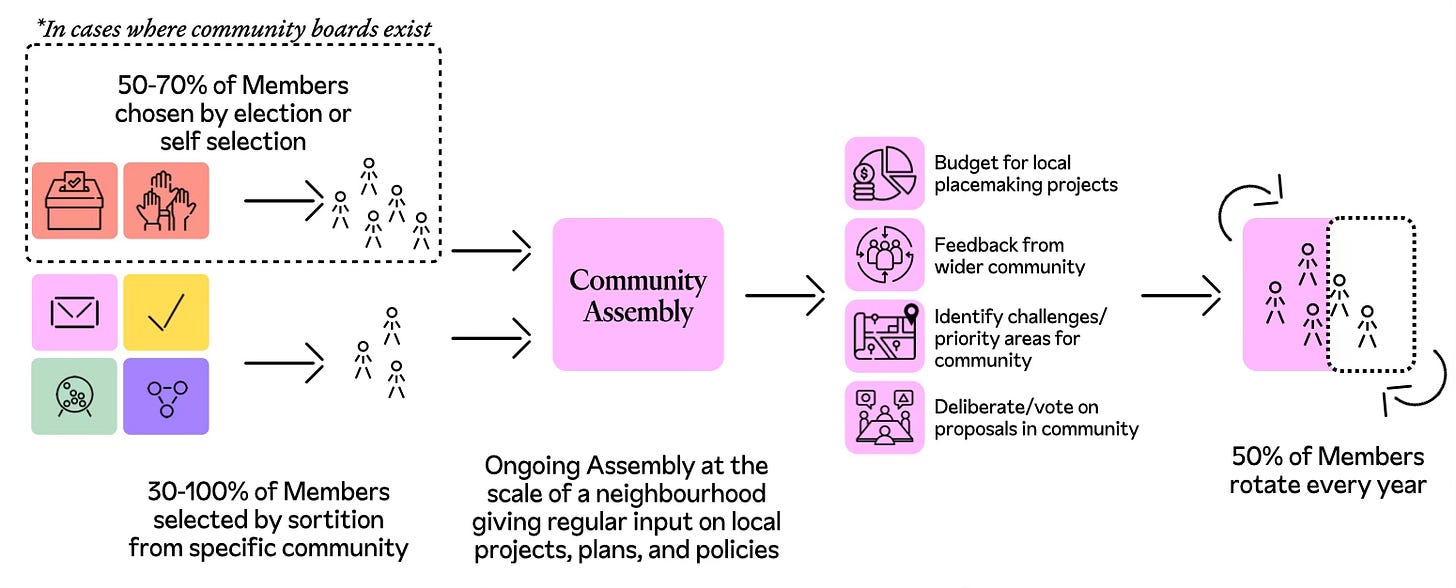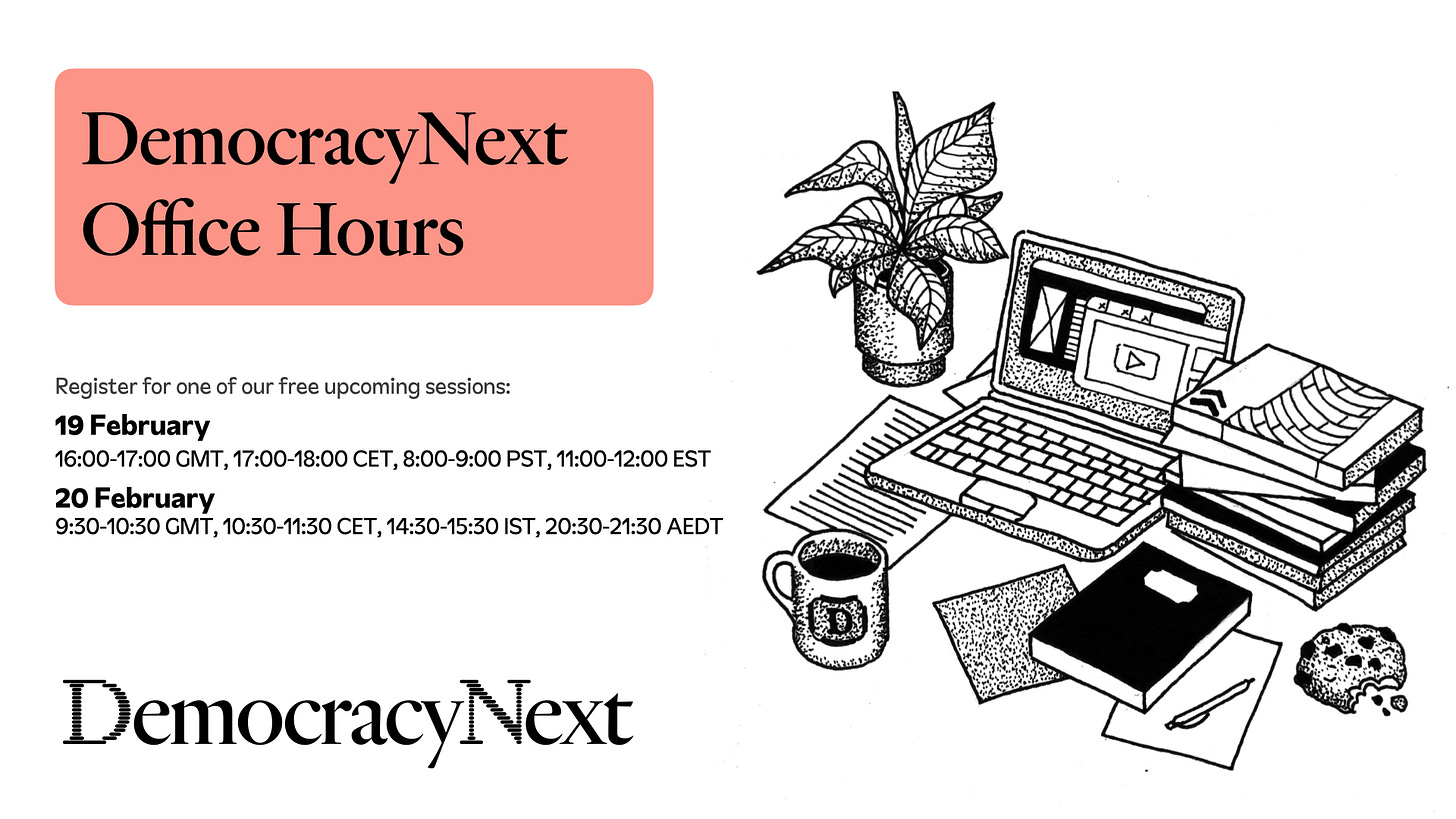🏡 New paper: Six ways to democratise city planning
Plus, an open call for applications from cities to partner with us!
DemocracyNext published today a paper on Six Ways to Democratise City Plannng, available now at our website in English, Spanish and French. The paper is the result of nine months of consultations with a task force of experts in deliberative democracy, planners, architects, urbanists, city government officials, investors, developers, and civil society organisations.
On 13 and 14 February, we invite you to join our virtual panels to discuss the paper with task force members. Session 1 features DemocracyNext Project Lead for Urban Planning James MacDonald-Nelson, DemNext Founder/CEO Claudia Chwalisz, architect, planner and founder of Creative Urban Alchemy Ifeoma Ebo, and Manager, Public Consultation, Parks, Forestry & Recreation, at the City of Toronto Daniel Fusca; Session 2 features James MacDonald-Nelson, Claudia Chwalisz, Associate Professor at TU Delft in the Netherlands Trivik Verma, and Senior Project Leader, BUUR Part of Sweco & Co-founder of Cakri asbl Diego Luna Quintanilla.
We are excited to apply these ideas to the real world. To that end, we’ve launched an Open Application for cities to apply to partner with us, to contextualise, and implement the ideas outlined in the proposal. More at our website.
The future of the cities we inhabit and where we spend our daily lives matters to all of us in very tangible ways. This future is also collective. We share the spaces we call home with numerous beings. Balancing a diversity of people’s needs and preferences, concerns for environmental and social justice, a flourishing living planet, sustainability and resilience, communities’ health and well-being, as well as a desire for beauty, joy, and belonging is no easy feat. So many of these things are interconnected and are directly and deeply impacted by urban planning and the multiple other decisions we take about our built environment.
Over nine months of consultations, we have found there is general agreement amongst different actors in the urban planning ecosystem – planners, architects, city government officials, mayors and elected councillors, investors, developers, civil society organisations, and citizens – that the current decision-making system is not equipped to tackle today’s challenges in a dynamic, effective, or inclusive way.
Those challenges include:
Affordable housing crisis: Many cities are confronted with a real housing crisis and decisions on how to address this are often stuck. They face a shortage of affordable housing, leading to rising homelessness and housing insecurity for large segments of the population.
Population growth is straining resources: Rapid urbanisation is leading to increased demand for housing, transportation, services, and infrastructure, putting a strain on existing resources. This dynamic conflicts with challenges of land capture and inequitable distribution of wealth that directs resources away from where they are needed the most.
Environmental sustainability: Climate change, air pollution, loss of biodiversity and green space, and natural disasters pose significant threats to cities, necessitating strategies for resilience, sustainable development, nature-based solutions, and emissions reduction. Cities in regions prone to natural disasters (such as earthquakes, hurricanes, or floods) face the additional challenge of preparing for and responding to these extreme events.
Public health and well-being: Issues such as mental health challenges, the opioid epidemic, an ageing population, and responses to public health emergencies like pandemics pose significant challenges for city governments.
Inequality and inclusion: Cities often struggle with disparities in income, access to education, healthcare, and opportunities, all of which disproportionately affect minoritised communities, which can also be linked to issues of social cohesion, tensions, and divisions.
Accessible mobility is not available to everyone: Accessibility and proximity to multi-modal mobility options and other public services and facilities is not evenly distributed amongst the population.
The challenges that cities face today are not only a result of the specific decisions made in recent decades, but also stem from the way in which these decisions have been made. We see a need to change how people are integrated into the process of urban planning to create better, bolder, consensus-driven solutions to the complex challenges outlined above, in a way that engenders much greater legitimacy. This demands a departure from the status quo.
For more effective and inclusive decision making that enables action and gives people agency to shape their cities into thriving and healthy places, people should be able to wield greater power in shaping those decisions in an ongoing way, not only by voicing their opinions in town hall meetings, or as part of formal or mandatory consultation processes.
This proposal is not simply about improving one-off participation processes, it is about enriching and expanding how we engage with people by creating a deeper culture of engagement that can enable the conditions for a systemic, structural shift.
Who makes these decisions, and how they are made matter greatly. We argue that the ‘who’ and the ‘how’ of urban planning decision making need to change. To live in thriving and healthy cities, we propose six possible ways to instigate systemic changes that can democratise the governance of urban planning decisions through Citizens’ Assemblies and connected participatory approaches.
Depending on a city’s current starting point, at least one, if not multiple, of these options can be seen as an initial ‘way in’ to begin making systemic changes to urban planning decision making. The six ways are detailed in Chapter 5, outlined as scenarios:
If you are a city or a region about to initiate a major urban infrastructure project consider initiating an ad-hoc Citizens’ Assembly to shape project objectives and key design goals that are more aligned with the community’s wants and needs.
If you are a developer in the early stages of a large urban development project, consider implementing an ad-hoc Citizens’ Assembly to generate higher quality, community-supported design strategies and site programming that, in turn, enables the creation of places where people can connect, live, and thrive.
If you are a city about to embark on developing your next long-term plan, a significant urban policy, or a financial plan, consider initiating this process with an ad-hoc Citizens’ Assembly to develop a citizen-driven vision for the city, a multi-year budget, or a planning policy that is aligned with and reflects the needs, values, and desires of the city’s residents.
If you are a city, or a region, frustrated with the status quo of legally-required public consultation, commit to improving the quality of mandatory public engagement by implementing an ad-hoc Citizens’ Assembly for a significant urban development project instead.
If you are a member or leader of a community board or neighbourhood association and want increase the membership’s representativeness of the community, consider changing how people are chosen to be part of the board or association by using sortition to select new Members / OR If you are a municipality or a civil society organisation in a city where community boards or neighbourhood associations do not exist, consider creating new sortition-based Community Assemblies to represent each district, borough, ward, or neighbourhood (depending on the size/configuration of the city).
If you are a city that is already familiar with Citizens’ Assemblies, how they work and their benefits, but want to implement them to tackle city-wide challenges in an ongoing way, consider implementing a city-wide Citizens’ Assembly that convenes on a regular basis to tackle ongoing, systemic, city-wide challenges by forming recommendations that shape key urban policies, the city’s long-term vision, amendments to this vision, and significant development projects.
At the heart of these scenarios are three types of Citizens’ Assemblies with rotating Members selected by lottery (sortition) - city-wide, community, and ad-hoc. These representative and deliberative Assemblies are envisioned to be a core part of a much wider participatory ecosystem that involves digital surveying, participatory data collection and map-making, citizen science, and community-driven initiatives like placemaking, public dialogues, and design workshops.
We have thought about Citizens’ Assemblies holistically, as an intrinsic part of a city’s decision-making processes. This means there should be a direct connection to the relevant public authority and other key actors, including managers, urban planners, developers and investors, civil society groups, architects, and researchers.
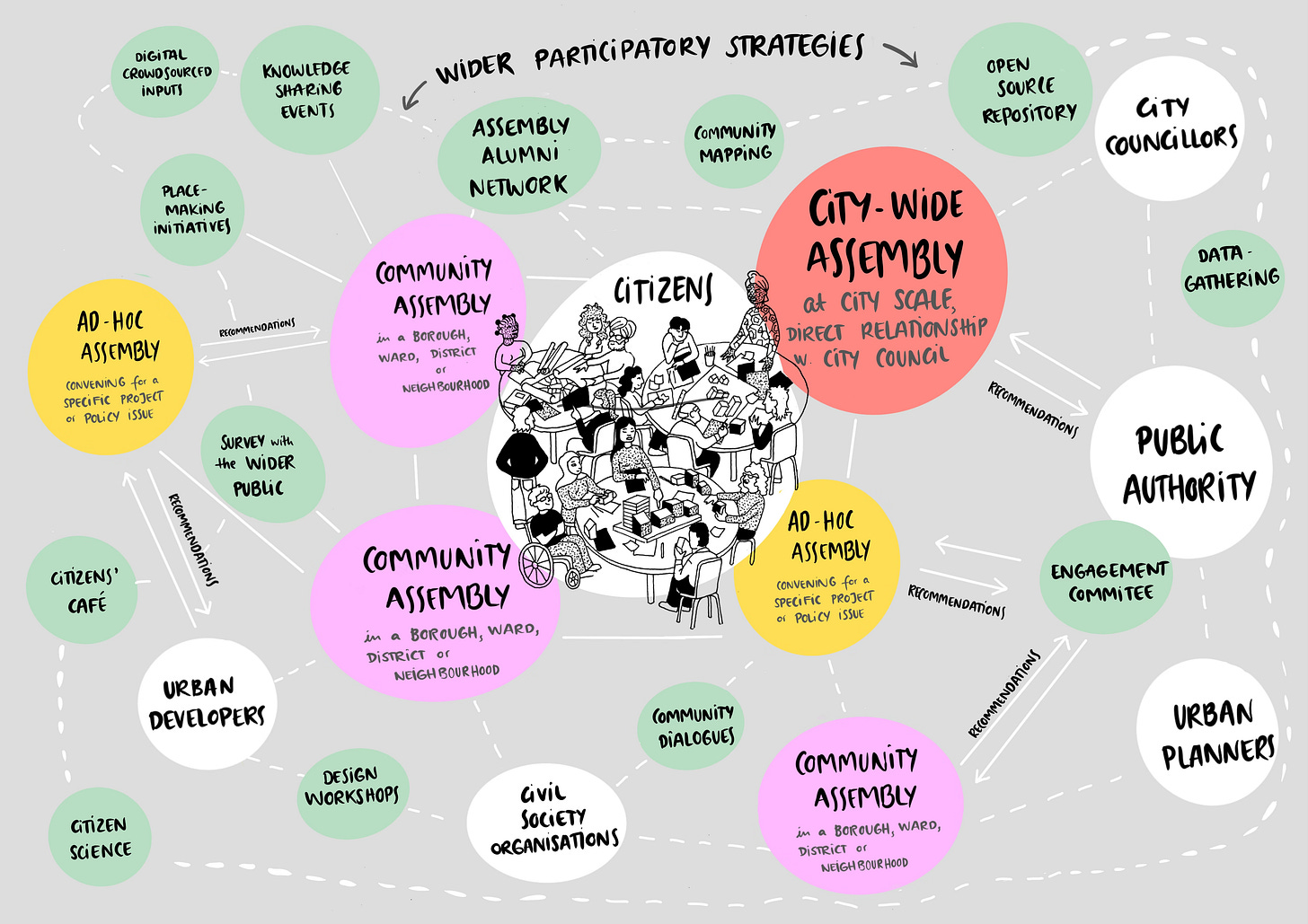
Finally, we suggest practical ways to get started in implementing these ideas depending on context, taking into account a city’s size, existing institutions and processes, and resources available.
For more, read the full paper in English, Spanish, or French here.
We encourage municipalities to apply to partner with us in implementing these ideas here.
Finally, we will host a call with interested cities to answer any further practical questions about the application process and how a collaboration with DemocracyNext would work. We will host two calls to accommodate different time zones on 21 February. You can register below:
21 February - (9:00-10:00 GMT, 10:00-11:00 CET, 14:00-15:00 IST, 20:00-21:00 AEDT)
21 February - (9:00-10:00 EST, 14:00-15:00 GMT, 15:00-16:00 CET, 19:00-20:00 IS)
Do you have questions about Citizens’ Assemblies and how they work?
See if you can find a quick answer in our Assembling an Assembly Guide, and if you need further advice, drop in for a group Q&A with one of the DemNext team members. We’ll do our best to answer them.
Register here for one of our free upcoming sessions:
19 February 17:00-18:00 CET, 8:00-9:00 PST, 11:00-12:00 EST.
20 February 10:30-11:30 CET, 14:30-15:30 IST, 20:30-21:30 AEDT.
If you share your questions upon registration, it will help us prepare any additional links, resources, or examples to share with you during the session.
We are testing interest in and the format of these office hours sessions, which will evolve over time. Questions received during the sessions will also help us develop an online learning program on Citizens’ Assemblies, which we hope to make publicly available towards the end of 2024/early 2025.
🛠️ What we’re up to:
The Apolitical Foundation has named DemocracyNext and several peer organisations as a “Pioneering Practitioner: Democratic Innovation Organizations to Watch.” We’re honoured to be included on this list as a group which “support[s] politicians to empower citizens and develop better policies for people and the planet.”
Claudia Chwalisz will be speaking at the Yale conference on Governing Citizens’ Assemblies and Governing (with) AI organised by our Advisory Council member Hélène Landemore on 28 Feb-1 March
📖 What we’re reading:
Harvard technologist Bruce Schneier has shared his account of a recent democracy workshop at the Ash Center, in which our own Claudia Chwalisz participated. Schneier reflected:
Modern democracy was invented in the mid-eighteenth century, using mid-eighteenth-century technology. Were democracy to be invented from scratch today, with today’s technologies, it would look very different. Representation would look different. Adjudication would look different. Resource allocation and reallocation would look different. Everything would look different, because we would have much more powerful technology to build on and no legacy systems to worry about.
University of Canberra Professor Nicole Curato (who serves on our Advisory Board) and several co-authors have published a debate on the key question: Can Deliberative Democracy be Decolonized? In a powerful essay, Curato writes:
We need to talk about this because the Eurocentric foundations of deliberative
democracy are implicated in advancing a worldview responsible for the conceptual erasure of societies that have existed before colonialism. It is a worldview that sees Europe as the main referent of progress or modernity or a benchmark for where the world is headed. This may have happened ages ago, but the legacy remains today.


